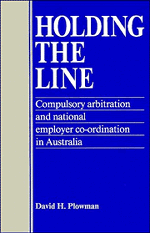Book contents
- Frontmatter
- Contents
- List of tables and figures
- List of abbreviations
- Acknowledgements
- Introduction
- Dedication
- 1 Industrial legislation and the rise of permanent employer associations 1890–1906
- 2 The Higgins era 1907–1920
- 3 Rival shops 1921–1929
- 4 Depression and recovery 1930–1939
- 5 War and government executive action 1940–1949
- 6 Consolidation 1950–1959
- 7 The National Employers' Associations 1960–1972
- 8 Confederation 1973–1988
- 9 Models of national employer co-ordination
- Appendices
- Bibliography
- Records of organisations
- Index
5 - War and government executive action 1940–1949
Published online by Cambridge University Press: 05 November 2011
- Frontmatter
- Contents
- List of tables and figures
- List of abbreviations
- Acknowledgements
- Introduction
- Dedication
- 1 Industrial legislation and the rise of permanent employer associations 1890–1906
- 2 The Higgins era 1907–1920
- 3 Rival shops 1921–1929
- 4 Depression and recovery 1930–1939
- 5 War and government executive action 1940–1949
- 6 Consolidation 1950–1959
- 7 The National Employers' Associations 1960–1972
- 8 Confederation 1973–1988
- 9 Models of national employer co-ordination
- Appendices
- Bibliography
- Records of organisations
- Index
Summary
By the time Britain declared war on Germany in September 1939 developments in federal arbitration had created the need for employer cohesion. Such cohesion was not easy to arrive at and attempts, emanating largely from the CCEA, to create a permanent national peak council of employers were never seriously pursued by other employer groups. Instead, a loose ad hoc Interstate Conference of Employers had been established for the purpose of co-ordinating the increasing number of national ‘test cases’. Also, by the end of the 1930s, the major national umbrella organisations – the CCEA, and the ACMA – had both experienced internal schisms over the issue of uniform federal regulation of wages and hours of work. The Chamber of Manufactures of New South Wales, and the federations in that state and in Victoria, actively sought federal regulation. The other chambers and federations continued to support state regulation.
Developments during the war and immediate post-war periods, which are examined in the first part of this chapter, generated added reasons for employer solidarity and cohesion. Wartime regulation created the need for unified political activities to ensure that employers' long-term prospects were not jeopardised. Of great importance in this context was the return to government of Labor in 1941, during a period in which it was not constrained by the limiting industrial powers of the Constitution.
- Type
- Chapter
- Information
- Holding the LineCompulsory Arbitration and National Employer Co-ordination in Australia, pp. 100 - 124Publisher: Cambridge University PressPrint publication year: 1989

